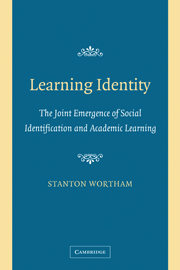Book contents
- Frontmatter
- Contents
- Acknowledgements
- 1 Self/Knowledge
- 2 Social Identification and Local Metapragmatic Models
- 3 Academic Learning and Local Cognitive Models
- 4 Tyisha Becoming an Outcast
- 5 Maurice in the Middle
- 6 Denaturalizing Identity, Learning and Schooling
- Appendix A Abbreviations of Names
- Appendix B Transcription Conventions
- References
- Index
3 - Academic Learning and Local Cognitive Models
Published online by Cambridge University Press: 05 June 2012
- Frontmatter
- Contents
- Acknowledgements
- 1 Self/Knowledge
- 2 Social Identification and Local Metapragmatic Models
- 3 Academic Learning and Local Cognitive Models
- 4 Tyisha Becoming an Outcast
- 5 Maurice in the Middle
- 6 Denaturalizing Identity, Learning and Schooling
- Appendix A Abbreviations of Names
- Appendix B Transcription Conventions
- References
- Index
Summary
Chapter 2 has shown that individual students become socially identified across trajectories, as metapragmatic models of identity come consistently to apply to them both within and across events. Individuals' identities seem natural not only because of sociohistorically developing models like those described by Hacking (1990) and others, but also because of locally developing models like those that emerge in a classroom over a year, and because of the work participants do within events to make sociohistorical and local models fit individuals. This chapter sketches an account of academic learning that reveals important similarities between academic learning and social identification. Academic learning also occurs across trajectories as students draw on and construct cognitive models that help them make sense of curricular content. Like metapragmatic models, these cognitive models develop and circulate both sociohistorically and locally. An adequate account of academic learning must describe resources from different timescales, like the sociohistorical and the local, and explain how various resources work together to constitute academic learning.
The first part of this chapter presents an account of academic learning, describing how such learning depends on locally developing cognitive models. The second part of the chapter illustrates this account by analyzing how students in Mrs. Bailey and Mr. Smith's classroom learned about two central themes from the curriculum. The last part of the chapter describes how social identification and academic learning can overlap with and facilitate each other.
- Type
- Chapter
- Information
- Learning IdentityThe Joint Emergence of Social Identification and Academic Learning, pp. 90 - 147Publisher: Cambridge University PressPrint publication year: 2005



